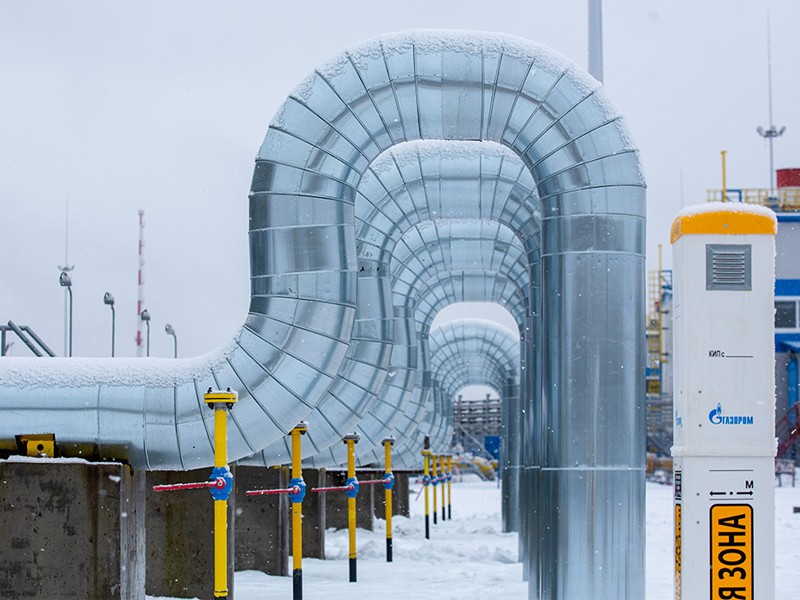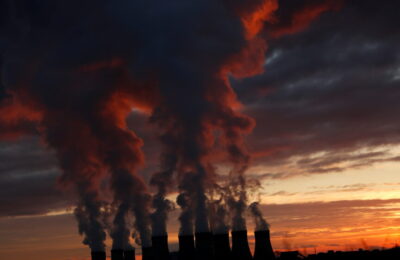An editorial from Nature argues that moving away from Russian oil and gas must mean developing renewable alternatives.
The Nord Stream 2 pipeline was designed to boost Europe’s Russian gas imports.Credit: Andrey Rudakov/Bloomberg/Getty
Vladimir Putin’s invasion of Ukraine initiated Europe’s largest war since the Second World War. The United States and many European nations have responded to the Russian president’s actions by cutting trading, financial and scientific links with Russia on a scale never previously seen for a permanent member of the United Nations Security Council.
But Europe’s energy needs are stopping many countries from taking even stronger action on the economic front. Russia supplies the European Union with around 40% of its natural gas, as well as about 25% of its oil and almost 50% of its coal. And this trade is continuing. It’s a weakness that Putin has exploited. Last week, he passed a decree stating that the gas supplies of “unfriendly” nations would be turned off if customers didn’t pay in roubles (rather than US dollars or euros).
Putin’s move seems to be intended as both a retaliation against sanctions and an attempt to shore up the rouble; the currency lost around half of its value in the 2 weeks after the 24 February invasion, reaching a record low of roughly 150 roubles to the dollar. It has since rebounded, but the outlook remains volatile.
European leaders rightly rejected Putin’s demands and, for now at least, the Kremlin looks to be backing down. Researchers and analysts think Putin is unlikely to cut off gas supplies because Russia would lose a large fraction of its daily €700-million (US$771-million) income from the EU — money that it is currently using to support its military. And Russia is not in a position to recoup this loss by redirecting its gas supplies to friendlier countries, because this would necessitate the construction of new infrastructure, which cannot be done quickly.
Whatever happens, the threat is a sign that the EU needs to accelerate its efforts to relinquish its dependence on Russia’s fossil fuels. It also underscores something that researchers who study climate, energy and economics have been saying for decades: that climate security and energy security are linked.
Researchers contacted by Nature say that European countries should be able to get through the next winter without Russian imports or power outages. However, to do so would require immediate action on many fronts, including intensive international cooperation to boost imports of natural gas from other countries; the launch of a burst of clean-energy projects; and the introduction of a host of energy-conservation and efficiency measures, possibly including energy rationing.
If the immediate goal is to keep the lights on, the long-term goal must be decarbonization, which will allow Europe to simultaneously end its dependence on Russia and meet its climate goals. As this week’s report from the Intergovernmental Panel on Climate Change indicates (see go.nature.com/3k7vgu0), it means rapidly replacing the fossil fuels that power national and regional electricity systems with renewable alternatives. It also means deploying vehicles that run on electricity or renewably sourced hydrogen, and retrofitting homes and businesses to use less — and produce more — energy. Moreover, a suite of energy and carbon-capture strategies will be needed to clean up heavy industry. None of this will be easy, but if the world wants both a more secure and a cleaner future, we don’t have a choice.
Scientists and environmentalists have been making this case for decades, warning governments that fossil fuels destabilize not only the climate, but also geopolitics, by creating dependencies on problematic regimes.
Whether or not European countries decide to stop buying Russian gas, they will almost certainly experience considerable economic pain as prices continue to increase. With many businesses unable to withstand the coming shocks unaided, and the resulting potential for job losses, governments will have no option but to step in with relief.
European leaders are acutely aware that they are financing the enemy at their gates. They must remain united, and coordinate and accelerate the clean-energy transition — action that will be required if they are to achieve the goal set out in the Paris climate agreement of limiting global warming to 1.5 °C above pre-industrial temperatures.
In the short term, the need for energy security will probably see more power than usual generated using fossil fuels, but the overall message cannot now be faulted: European leaders must understand that decarbonization is the answer to both energy and climate security. And if they manage to lay the groundwork for a cleaner future as part of their response to the war in Ukraine, theirs will be a lesson for the world.
Nature 604, 7-8 (2022)
doi: https://doi.org/10.1038/d41586-022-00920-y



